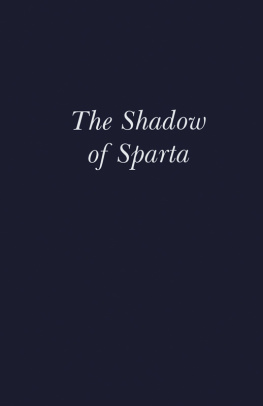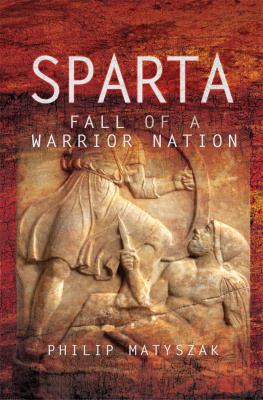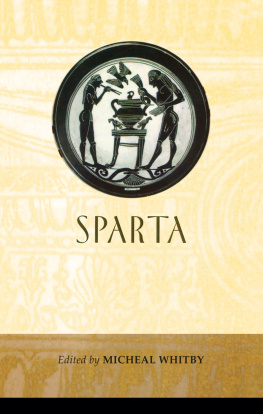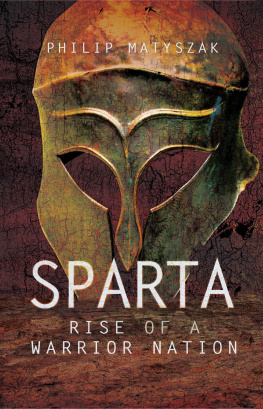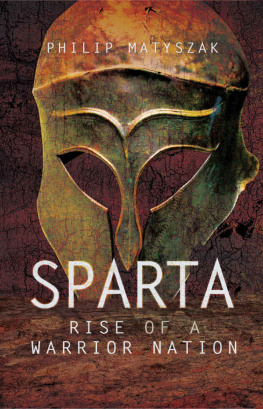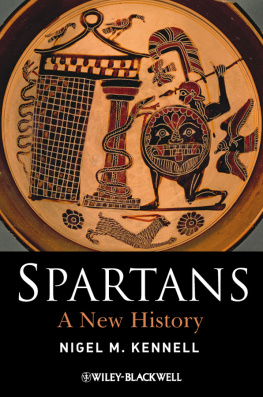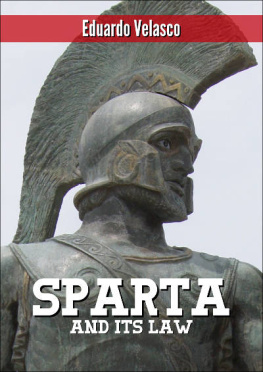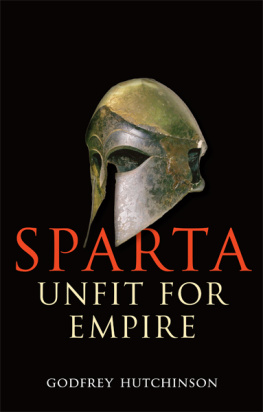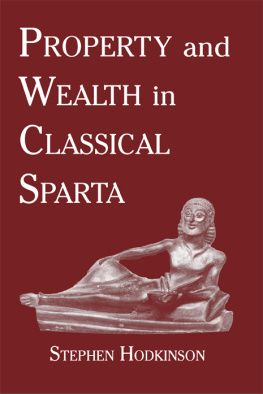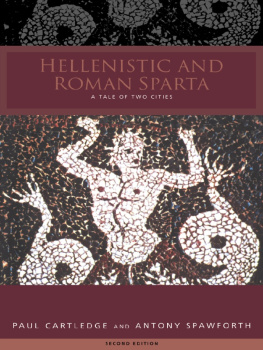The Shadow
of Sparta
The Shadow
of Sparta
Edited by
Anton Powell
and
Stephen Hodkinson

Originated and prepared for press
by The Classical Press of Wales,
15 Rosehill Terrace, Swansea, U.K.
First published 1994
by Routledge
11 New Fetter Lane, London EC4P 4EE
Simultaneously published in the USA and Canada
by Routledge
29 West 35th Street, New York, NY 10001
1994 Anton Powell and Stephen Hodkinson
All rights reserved. No part of this publication may be reprinted or reproduced or utilized in any form or by any electronic, mechanical, or other means, now known or hereafter invented, including photocopying and recording, or in any information storage or retrieval system, without permission in writing from the publishers.
British Library Cataloguing in Publication Data
Shadow of Sparta
I. Powell, Anton II. Hodkinson, Stephen 938.9
Library of Congress Cataloguing in Publication Data
Applied for
ISBN 0-415-10413-0
CONTENTS
William Poole (University College London)
David Harvey (Exeter)
Alfred S. Bradford (University of Missouri, Columbia)
Michael Whitby (University of St Andrews)
Christopher Tuplin (University of Liverpool)
Stephen Hodkinson (University of Manchester)
Vivienne Gray (University of Auckland)
Anton Powell (Institute of Classics, University of Wales)
Eckart Shtrumpf (University of Colorado, Boulder)
N.R.E. Fisher (University of Wales, Cardiff)
Introductory Note and Acknowledgements
This work began as a colloquium held in March 1991 at the University of Wales, Cardiff, funded by Cardiff and organised under the aegis of the London Classical Society and the University of Manchester Ancient History Seminar. The original idea for the project was Powells. Hodkinson and Powell shared equally in the inviting of contributors. Powell, with help from Hodkinson, saw the resulting book through the press. The aim of the project was to cast light both on non-Spartan thought and on Spartan practice. Contributors were asked to examine possible effects of images of Sparta, whether realistic or not, upon the thought of non-Spartan Greeks. Various approaches have been used. Some contributors trace what might seem fair representation or honest misunderstanding by non-Spartans of Spartan reality. Others examine anti-Spartan invective and pro-Spartan apologia in Athenian poety. Others again ask whether ideal systems of education and of politics, described by Athenian prose-writers, were the product of conscious extrapolation of Spartan methods: how far, in short, writers sought to commend an imaginary super-Sparta.
The editors wish to thank Ernest Buckley for his generous, patient and enlightening approach to typesetting. They are also grateful for the prompt and effective work of their consultants, Jane Rowe and Mary-Jane Perks.
I
Euripides and Sparta
William Poole
While the Chorus of captive Trojan women are waiting to be allocated to their Greek masters, they speculate on where they might like to be sent. Athens, they think (Tr. 208 f.), is where they would most wish to go; failing that (214 f.), somewhere in Thessaly at the foot of Mount Olympus, where the Pen eus flows, bringing prosperity and fruitfulness, as they have heard reported. They mention with approval two other places: Sicily, the land of Mount Aetna, opposite to Phoenicia; and the valley of the River Crathis, indicating Catania and Thurii as cities they might find it acceptable to go to. But not to Sparta, to the swirling streams of the Eurotas, the hated home of Helen, where as slaves they would come face to face with Menelaus, the sacker of Troy. Is this outburst against Sparta to be understood simply on a mythological plane, or is Euripides also making a hostile statement about the great contemporary adversary of Athens? Most people, I believe rightly, have taken the latter view. In this case the anachronistic references to cities in Magna Graecia seem to me to be decisive; but such questions are not always easy to answer convincingly.
The Troades was produced in March 415 BC, therefore written during a lull in hostilities between Athens and Sparta; but some ten years earlier a similar dilemma confronted the Chorus in the Hecuba (444 f.) This Chorus propose as possible destinations for themselves in the following order Doris (whose most important city is Sparta), Phthia, the islands (particularly Delos), and Athens; and they conclude with a general lament at the prospect of slavery in any foreign land. Of these four possible destinations they spend most time on the last two, where they imagine a captivity devoted to religious tasks; they comment briefly on the fertility of Phthia, but they say nothing about Doris, and they express no preferences. It is possible to read this as a muted criticism of contemporary Sparta: slavery in a Dorian land is too terrible even to speak of.
Returning to the Troades, we find (30 f.) that the less important captives have been assigned to masters in Arcadia, Thessaly and Athens; but these are clearly only mentioned as examples among others. At 187 f. the Chorus imagine men from Argos, Phthia or the islands bearing them far away from Troy. Just before the passage I began by quoting, they conjure up various unpleasant fates that might befall them, concluding with that of being a miserable attendant charged with carrying the sacred waters of Pirene in Corinth. But for no other place do they express such revulsion as for Sparta, and it is noteworthy that, as soon as Talthybius comes in to tell them what has been decided for them, they immediately suppose (233 f.) that they must already be slaves of the land of Doris. When the herald tells them to ask each in turn and not all at once, they mournfully suggest (242 f.) Thessaly, Phthia or Thebes as places to which they may have been allotted. The destinies of the members of the royal family are then explored in detail. Finally (1092 f.), young captive women are pictured being borne away from their mothers by the Greeks to Salamis or Corinth. I see no contemporary significance in these choices of location beyond the rather trivial point that whenever Euripides lists places of slavery he is careful to include cities that fought on both sides in the Peloponnesian War. The above thoughts illustrate some of the difficulties that confront us in trying to determine Euripides attitude to contemporary events in general, and Sparta in particular. How can we know what to count as evidence?
Euripides was a tragedian, not a historian, and unlike some earlier tragedians, such as Phrynichus in the Capture of Miletus and Phoenician Women, or Aeschylus in the Persians and Women ofAetna, he never chose to dramatize contemporary or near-contemporary events. We should not therefore in my view seek to infer the course of contemporary events by reference to supposed mythological analogues in his plays. But it would be surprising if he did not intend members of his audiences to apply the universal themes with which tragedy deals to the particular circumstances prevailing at the time of performance. Knowing independently the date of production of the Troades, for example, can we doubt that during the prologue Euripides expected his audience to remember the outrage at Melos? Of course these circumstances will have been perceived differently by different individual spectators, and we do not have any reliable external evidence of how Euripides himself perceived them.
With regard to Sparta there are a number of interpretative problems we have to face, but one possibility we can dismiss immediately is that he was seeking to influence Spartan opinion, since, if Plutarch (
Next page
